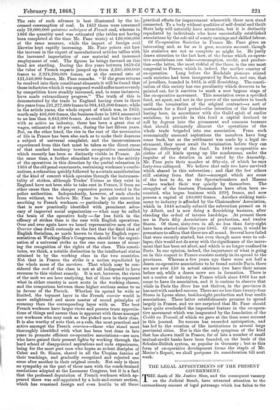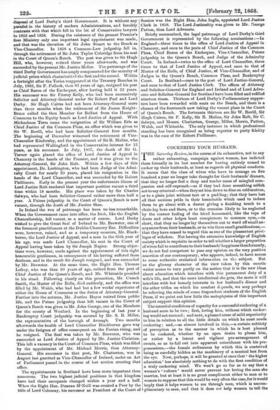THE LEGAL APPOINTMENTS OF THE PRESENT GOVERNMENT.
THE death of Mr. Justice Shee, and the consequent vacancy on the Judicial Bench, have attracted attention to the extraordinary amount of legal patronage which has fallen to the disposal of Lord Derby's third Government. It is without any parallel in the history of modern Administrations, and forcibly contrasts with that which fell to the lot of Conservative lawyers in 1852 and 1858. During the existence of the present Premier's first Ministry only one important legal appointment was made, and that was the elevation of Sir John Stuart to the Bench as Vice-Chancellor. In 1858 a Common-Law judgeship fell in, through the retirement of Sir John Taylor Coleridge from his seat in the Court of Queen's Bench. The post was given to Sir Hugh Hill, who, however, retired three years afterwards, and was succeeded by the present Mr. Justice Mellor. The patronage of the third Derby Government has amply compensated for the scarcity of judicial prizes which characterized the first and the second. Within a fortnight after the Tories reappeared at the Treasury Benches in July, 1866, Sir F. Pollock, then 83 years of age, resigned his post as Chief Baron of the Exchequer, after having held it 22 years. His successor was Sir Fitzroy. Kelly, who had been successively Solicitor and Attorney-General under Sir Robert Peel and Lord Derby. Sir Hugh Cairns had not been Attorney-General more than three months when the retirement of Sir James Knight- Bruce called the then Member for Belfast from the House of Commons to the Equity bench as Lord Justice of Appeal. With Michaelmas Term came the resignation of Sir William Erie as Chief Justice of the Common Pleas, an office which was given to Sir W. Bovill, who had been Solicitor-General four months. The beginning of December witnessed the retirement of Vice- Chancellor Kindersley, and the appointment of Sir R. Matins, who had represented Wallingford in the Conservative interest for 13 years, as his successor. In July, 1867, the death of Sir G. Turner again placed the office of Lord Justice of Appeal in Chancery in the hands of the Premier, and it was given to the Attorney-General, Sir John Rolt. Within a few days of this appointment, Dr. Lushiugton, who had been Judge of the Admi- ralty Court for nearly 30 years, placed his resignation in the hands of the Lord Chancellor, and was succeeded by Sir Robert Phillimore. Early in the present year the unfortunate illness of Lord Justice Rolt rendered that important position vacant a third time within 18 months. His place was taken by Sir Charles Selwyn, who had been Solicitor-General rather more than half a year. A Puisne judgeship in the Court of Queen's_Bench is now vacant, through the death of Mr. Justice Shee.
In Ireland the run of patronage has been no less remarkable. When the Government came into office, the Irish, like the English Chancellorship, fell vacant, as a matter of course. Lord Derby wished to give the Great Seal of Ireland to Mr. Brewster, one of the foremost practitioners at the Dublin Chancery Bar. Difficulties were, however, raised, and as a temporary measure, Mr. Black- burne, the Lord Justice of Appeal, and a man in the 85th year of his age, was made Lord Chancellor, his seat in the Court of Appeal having been taken by Sir Joseph Napier. Strong objec- tions were, however, made against the appointment of this right honourable gentleman, in consequence of his having suffered from deafness, and in the result Sir Joseph resigned, and was succeeded by Mr. Brewster. At the same time, the Right Hon. Thomas Lefroy, who was then 90 years of age, retired from the post of Chief Justice of the Queen's Bench, and Mr. Whiteside presided in his stead. Following closely on this promotion, Mr. Cusack Smith, the Master of the Rolls, died suddenly, and the office was filled by Mr. Walsh, who had had but a few weeks' experience of either the House of Commons or the duties of Attorney-General. Further into the autumn, Mr. Justice Hayes retired from public life, and the Puisne judgeship thus left vacant in the Court of Queen's Bench was given to Mr. John George, one of the Members for the county of Wexford. In the beginning of last year a Bankruptcy Court judgeship was secured by Mr. S. B. Miller, the representative of the borough of Armagh. Two months afterwards the health of Lord Chancellor Blackburne gave way under the fatigues of office consequent on the Fenian rising, and he resigned. The Seal was taken by Mr. Brewster, who was succeeded as Lord Justice of Appeal by Mr. Justice Christian. This left a vacancy in the Court of Common Pleas, which was filled by the appointment of Mr. Michael Morris, then Attorney- General. His successor in that post, Mr. Chatterton, was in August last gazetted as Vice-Chancellor of Ireland, under an Act of Parliament passed in the course of last session creating that office.
The appointments in Scotland have been more important than numerous. The two highest judicial positions in that kingdom have had their occupants changed within a year and a half. When the Right Hon. Duncan M'Neill was created a Peer by the title of Lord Colonsay, his successor as President of the Court of Session was the Right Hon. John Inglis, appointed Lord Justice Clerk in 1858. The Lord Justiceship was given to Mr. Reorge Patton, then Lord Advocate.
Briefly summarized, the legal patronage of Lord Derby's third Government is represented by the following nominations :—In England—three times to the office of Lord Justice of Appeal in Chancery, and once to the posts of Chief Justice of the Common Pleas, Chief Baron of the Exchequer, Vice-Chancellor, Puisne judgeship in the Queen's Bench, and Judge of the Admiralty Court. In Ireland—twice to the office of Lord Chancellor, three times to that of Lord Justice of Appeal, and once to that of Master of the Rolls, of Chief Justice, of Vice-Chancellor, and of Judges in the Queen's Bench, Common Pleas, and Bankruptcy Court. In Scotland—once to the post of Lord Justice-General, and once to that of Lord Justice Clerk. The offices of Attorney and Solicitor-General for England and Ireland and of Lord Advo- cate and Solicitor-General for Scotland have been filled and refilled nineteen times. Thirteen of Lord Derby's Parliamentary suppor- ters have been rewarded with seats on the Bench, and there is a chance of the fourteenth now taking the vacant place in the Court of Queen's Bench. The fortunate thirteen are Sir W. Bovill, Sir Hugh Cairns, Sir F. Kelly, Sir R. Mains, Sir John Rolt, Sir C. Selwyn, and Messrs. Chatterton, George, Miller, Morris, Patton, Walsh, and Whiteside. The only instance in which professional standing has been recognized as being superior to party fidelity was in the case of Sir Robert Phillimore.



































 Previous page
Previous page